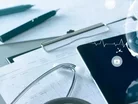Vodafone UK: How 5G and IoT tech will transform healthcare

A National Health Service (NHS) fit for the 21st century will need to harness the latest technology driven by 5G and the Internet of Things (IoT) as it moves forward from COVID-19, according to Anne Sheehan, Business Director, Vodafone UK.
Sheehan recognises how the NHS rose to the challenge of the pandemic. “Through innovation and hard work, it changed its ways of working at speed, with technology central to its ability to continue functioning effectively and serving the people who depend on it.”
Vodafone UK has produced a report, Better health, connected health, which takes an in-depth look at how 5G and IoT will transform the healthcare service of the future. Sheehan said the pandemic helped to transform the NHS at short notice - but it promises so much more in the future.
“The possibilities unleashed by 5G and IoT touch almost every part of the healthcare system, from the visible – think of remotely assisted surgery, or drones carrying transplant organs and drugs between hospitals – to the unseen but vital – think of IoT-enabled hospital equipment management systems using sensors to monitor stock levels automatically,” she said.
According to the report the public believe 40 new NHS hospitals, promised by the Government by 2030, should be fully equipped with the latest digital technology, including 5G.
“We have a perfect opportunity to ensure that digital technology is designed in from the start, so that the hospitals of the future can use the technology of the future.
“Healthcare has always been an early adopter of new technologies to help make it better, faster and more efficient. It is vital that the NHS be given the opportunity to maximise the benefits of the next big technological innovations, driven by 5G, as it has in the past.”
10 ways 5G technology can transform healthcare according to the WPI strategy report for Vodafone UK:
- Remote assisted surgery and training
5G’s high capacity and low latency will enable surgeons to use augmented reality (AR) technology to provide remote expert guidance on surgery without needing to be in the same operating theatre – or even the same country.
- Drones
Drones can be used to transport medical assets including organs for transplant quickly and more cheaply than by courier. In July, Vodafone announced a partnership with Skyports and Deloitte to use drones to transport medical supplies for NHS Scotland. Vodafone UK is now calling on the government to increase the number of drone trials in the UK with a fund of £30m, with emphasis on using cellular connectivity to support registration, tracking and beyond-visual-line-of-sight applications.
- Data sharing
The speed and capacity of 5G means large files, such as MRI scans, can easily be shared securely for review between clinicians in real time, enabling more patients to be moved along the care pathway more quickly.
- 5G-connected ambulances
5G connectivity can link paramedics working with a patient in an ambulance with a hospital clinician using high-resolution video and tools. Clinicians can examine the patient remotely and prescribe urgent treatment that the paramedics can carry out before the patient arrives at hospital. Vodafone UK is calling on the government to invest £10 million in 10 ambulances per trust in England.
- Asset tracking
Every time NHS equipment, from wheelchairs to bed linen, goes missing it costs the NHS money. Low-cost trigger tags on assets, combined with a series of beacons which constantly monitor where they are, means they can be found if they go missing or tracked if they are stolen.
- Smart buildings
IoT devices can be used in buildings to monitor how space is used and ensure that energy is only used where it is needed such as smart heating and ventilation systems only used when spaces are occupied.
- Heat detection cameras
The Vodafone Heat Detection Camera can screen the body temperature of patients, visitors and staff to help provide reassurance at a time of concern about COVID-19 infection, but also beyond.
- Social and technological prescribing
Technology such as wearable devices and monitoring systems can help people to stay healthy by living more active lifestyles, and support those with chronic conditions.
- Telemedicine
In Greece, the Vodafone Foundation Telemedicine Programme uses mobile technology combined with next generation medical devices to provide specialised healthcare, regardless of location.
- Connected Living
Vodafone’s Connected Living helps people with care needs to receive tailored and personalised support.
A poll carried out on behalf of Vodafone UK shows most of the public want the NHS to use 5G and IoT applications. Four-out-of-five of those polled say they would like to see 5G-connected ambulances. Three-out-of-five back the use of 5G remote assisted surgery and drone technology and believe that video consultations are more convenient than visiting a GP surgery or hospital. A total of 57% would be comfortable having medical appointments via video even once the coronavirus pandemic is over.
“By committing to make the NHS the world’s leading 5G healthcare provider, the Government can ensure that healthcare professionals and workers have the very best technology they need to do their jobs effectively,” said Sheehan.
Read the WPI strategy report for Vodafone UK
For more information on business topics in Europe, Middle East and Africa please take a look at the latest edition of Business Chief EMEA.
Featured Articles
SAP has announced it has appointed a new President for a newly-created EMEA region, aiming to make the most of the opportunities of cloud and AI technology
Technology giant SAP has expanded its portfolio with the acquisition of LeanIX, a leader in enterprise architecture management (EAM) software
To help businesses achieve increased productivity, Siemens and Microsoft are deepening their partnership by showcasing the benefits of generative AI



